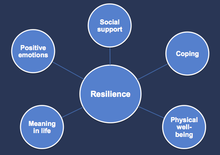- November 4, 2021
At the Mason Grad Insider, we’ve written plenty of blog posts about self-care, meditation, well-being, and resilience as a graduate student. But what about when that’s not enough? What can we do when we’ve realized that our mental health has declined; when there are issues we’d like to work through; or, simply when we decide we need a little extra support? This is where external mental health resources, such as counseling or group therapy, can come into play.
- December 1, 2021
You may have heard the phrase “I’m so burnt out” before. You may have said this phrase yourself – before grad school or during. This phrase certainly pops up more frequently around this time of year, with final papers, exams, and deadlines approaching. But what is burnout?
- April 14, 2017
Whether you have things under control or not, we all should find time to reflect on our resilience. At Mason, we define resilience as: Enhancing the capacity for successful adaptation in the face of stress, challenge, and adversity.
- February 27, 2020
Oftentimes, as graduate students, we feel the need to continue as if everything is fine, or that taking time to destress will take away from time that we could spend completing another assignment. In actuality, not being aware and recognizing that you need and deserve a break could negatively influence both your health and academic studies.
- September 30, 2020
So self-care has become a bit of a buzzword recently. But what does self-care actually mean? What does self-care look like for you?
- September 16, 2020
One of the keys to remaining resilient is knowing when to ask for help and when to take time to – as one of my colleagues reminds me – “Take care of you.” You might be thinking this is a somewhat selfish approach, but in the end, if you cannot take care of yourself, you are less likely to be at your best to attend to your studies and take care of others.






